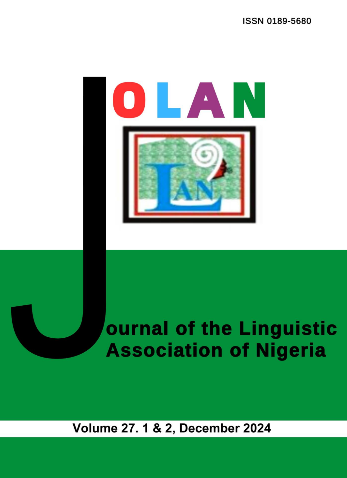Gaps and Absences in the English Expressions of Some Staff and Students in an English-As-A-Second Language University Setting
Keywords:
English Usage, Gaps and Absences, Systemic Functional Grammar, Nominal Group, Formal DiscourseAbstract
The use of English in second-language settings has attracted much attention from scholars over the years with much focus on the challenges that L2 users face as they engage the language in different communicative events. This paper highlights a kind of English usage indicating specific gaps and absences in the English expressions used in a Nigerian University setting with the aim of identifying the mechanisms involved in the emergence of these gaps and the danger they portend for effective English usage in formal contexts. By means of the non-participant observation method, relevant samples were gathered from randomly-selected staff and students in different formal contexts at different times in a Nigerian University. These were subjected to qualitative and structural analysis, using Halliday’s Systemic Functional Grammar with a focus on the nominal group structure and the lexico-grammatical system as revised by Halliday and Matthiessen (2004). Findings revealed that nouns acting as the head in the nominal group structure are omitted in the samples gathered so that the addressee is left to make out meanings from the expressions. Although interlocutors may become used to what is intended to be communicated, to an extent, as a result of consistent usage of such patterns, the gap created due to the absence of content words, which are nouns, at points where they ought to occur in the nominal group structure leads to ungrammatical English usage. This kind of speech behaviour encourages carelessly-constructed English expressions and makes formal discourse less formal.
References
Adegbite, W. 2009. The Psycholinguistics of English Language in Nigeria. Ibadan: Kraft Books.
Adegbite, W. 2014. A Dictionary of Nigerian English. Ile-Ife: Obafemi Awolowo University.
Awonusi, V.O. 2009. The English Language in a Global Context. ABK Dadzie and Segun Awonusi (Eds.) Nigerian English: Influences and Characteristics. Lagos: Sam Iroanusi Publications.
Fakeye, D.O. and Ogunsiji, Y. 2009. English Language Proficiency as a Predictor of Academic Achievement among EFL Students in Nigeria. European Journal of Scientific Research. 37(3). 490-495.
Halliday, M.A.K. 1985. An Introduction to Functional Grammar. London: Edward Arnold.
Halliday, M.A.K. 1994. An Introduction to Functional Grammar. 2nd Edition. London: Edward Arnold
Halliday, M.A.K. and Matthiessen, C.M.I.M. 2004. An Introduction to Functional Grammar. 3rd Edition. Britain: Hodder Arnold.
Jowitt, D. 2001. Nigeria's National Language Question: Choices and Constraints. Bamgbose et al. (Ed.) New Englishes: A West African Perspective. lbadan: Mosuro.
Matthiessen, M.I.M. and Halliday, M.A.K. 2009. Systemic Functional Grammar: A First Step into the Theory. Bilingual Edition, with Introduction by Huang Guowen. Higher Education Press.
Olayemi O.T. 2014a.Some Common Errors of Nigerian ESL Users. Communication in English. Directorate of the General and Entrepreneurial Studies. Olabisi Onabanjo University, Ago-Iwoye.
Olayemi, O.T. 2014b. Like as a Substitute for Content Words in Nigerian English Usage.Awka Journal of English Language and Literary Studies. Department of English Language and Literary Studies, Nnamdi Azikiwe University, Awka, Anambra State. 5(1). 83-87.
Olayemi, O.T. 2017. Like: An Appropriate Substitute for Prepositions in Nigeria in English Usage? Ijagun Journal of English Language and Literature. Department of English, Tai Solarin University of Education, Ijagun. 1(2). 133-144.














